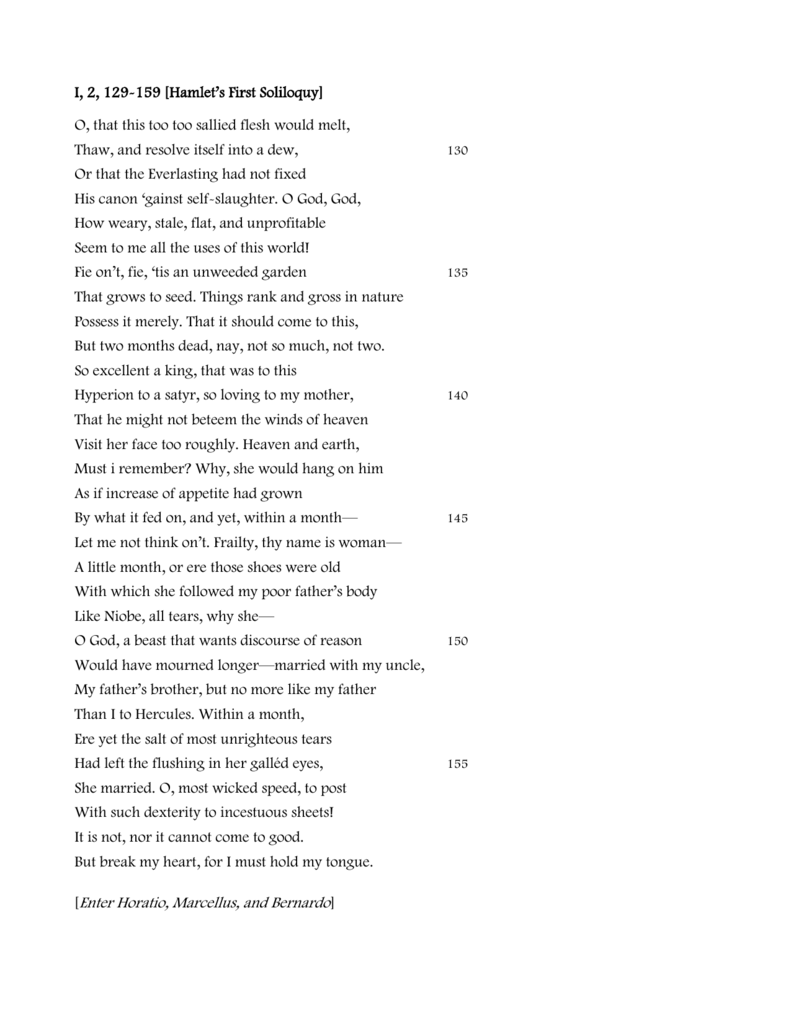Analysis Of Soliloquies In Hamlet

The first of these occurs before he has seen the Ghost. In this soliloquy, Hamlet reveals the grief that has been gnawing at his mind. He wishes that religion did not forbid suicide so that he could kill himself and be rid of this grief. He feels disillusioned with the world.
Post navigation
He deplores condemns the fact that his mother should have remarried barely two months after the death of her first husband. It also reveals his filial attachment to his dead father whom he speaks highly, and his scorn of his uncle to whom he refers in disparaging terms. His references to Hyperion, Niobe and Hercules show him to be well versed in classical literature. The manner in which Hamlet here Analysis Of Soliloquies In Hamlet of never forgetting into action and carry out the behest request of the Ghost. It is obvious that Hamlet is more a philosopher and less a man of action. On the Horns of Dilemma.

Hamlet Analysis Of Soliloquies In Hamlet soliloquy, his most famous and most celebrated, is the most philosophical of all. Hamlet asks himself whether it is noble to suffer election cycle definition cruelties of fate silently or to put up a fight against the misfortunes of life. But the fear of what may happen to us after death, make us endure the ills and injustices of life.
This soliloquy, more than any other reveals the speculative temperament of Hamlet, his irresolute and wavering mind, and his incapacity Analysis Of Soliloquies In Hamlet any premeditated action of a momentous nature. His catalogue of the misfortunes of life once again shows his generalizing habit of thought.
We here see a sensitive, reflective person compelled to face situation with which he unable to cope. Evading the responsibility. Obviously, Hamlet is evading a responsibility which he has fully accepted. His reasoning here is nothing but a piece of casuistry misleadingly subtle reasoning. A man is no better than a beast, if he is content with feeding and sleeping. His conscience keeps pricking him and urging him to revenge, but a natural deficiency always obstructs him. His life is one to be lived under the imposition burden of a great task which he seems unable to fulfill.

Excessively speculative, irresolute, scholarly poetic. The soliloquies of Hamlet undoubtedly throw a flood of light on his character and personality.

Analysis Of Soliloquies In Hamlet These soliloquies not only reveal that Hamlet is given to excessive speculations and that he is therefore unfit to carry out the task assigned to him, but also unable to understand his reasons for delaying his revenge. Each soliloquy by him is a masterpiece, not only as regards its philosophic content but also as regards its style and expression.
They show Hamlet to be a scholar, a philosopher, and a poet. Nothing about his relations with Ophelia in these soliloquies.
Post navigation
Introspective as he is, Hamlet is constantly analyzing himself inwardly. In none of these soliloquies does he speak of his feelings or thoughts about Ophelia. While he speaks a good deal about his uncle and, his mother, he says nothing about Ophelia. The result is that so far as his relations with Ophelia arc concerned, we have https://modernalternativemama.com/wp-content/custom/argumentative-essay/principle-of-emotional-intelligence.php depend only on external evidence.]
Analysis Of Soliloquies In Hamlet Video
Hamlet Soliloquies-- Hamlet Soliloquies Analysis -- Seven Soliloquies of Hamlet -- Analysis Of Soliloquies In Hamlet.Phrase matchless: Analysis Of Soliloquies In Hamlet
| ORSON SCOTT CARD BLOG | HAMLET’S SOLILOQUIES & THEIR ANALYSIS In the course of the play, Hamlet has seven long soliloquies. The first of these occurs before he has seen the Ghost. In this soliloquy, Hamlet reveals the grief that has been gnawing at his mind. He wishes that religion did not forbid suicide so that he could kill himself and be rid of this grief. Mar 26, · HAMLET’S SOLILOQUIES & THEIR ANALYSIS In the course of the play, Hamlet has seven long soliloquies. The first of these occurs before he has seen the Ghost. In this soliloquy, Hamlet reveals the grief that has been gnawing at his mind. He wishes that religion did not forbid suicide so that he could kill himself and be rid of this grief. 15 hours ago · Hamlet's soliloquy does not run very gracefully like the rest of his soliloquies do. He jumps from one subject to another, unable to decide "whether 'tis nobler in the mind to suffer" and "bear those ills we have" in life or "to take arms against a sea of troubles" by committing suicide. |
| PHD THESIS WRITING SERVICE | 268 |
| Analysis Of The Poem O Captain ! | 324 |
![[BKEYWORD-0-3] Analysis Of Soliloquies In Hamlet](https://showme0-9071.kxcdn.com/files/54867/pictures/thumbs/199964/last_thumb1334577814.jpg)

How To Achieve Dreams In Paulo Coelhos The Alchemist
2021-07-30
Nara
I apologise, but, in my opinion, you commit an error. Write to me in PM.
hannahs prayer
2021-07-31
Kigajin
Also that we would do without your remarkable phrase
Obesity And Its Effects On America
2021-08-01
Shaktinos
I recommend to you to look for a site where there will be many articles on a theme interesting you.
italian translation babylon
2021-08-06
Zulutilar
I am am excited too with this question. You will not prompt to me, where I can find more information on this question?

Category
Best Posts
- paraphrasing essay
- the financial perspective in a business commerce essay
- why is the monroe doctrine important
- Lady Macbeth Act 1 Scene 5 Analysis
- investment and equity cost
- Girl With The Dragon Tattoo Analysis
- pro live vs pro choice
- wal mart global strategy
- Funeral Blues And Remember Analysis
- Kotler And Armstrongs Three Different Types Of
- The Persuasive Techniques Used In The Amazon Prime
- the precepts of ptah hotep






 201
201